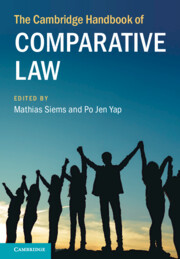Book contents
- The Cambridge Handbook of Comparative Law
- The Cambridge Handbook of Comparative Law
- Copyright page
- Contents
- Figures
- Tables
- Contributors
- Preface
- Abbreviations
- 1 Introduction
- Part I Methods of Comparative Law
- 2 Traditional Methods
- 3 Historical-Jurisprudential Methods
- 4 Critical Methods
- 5 Culture and Comparative Law Methodology
- 6 Linguistic Approaches
- 7 Qualitative Fieldwork
- 8 New Institutional Economics
- 9 Empirical Methods
- 10 Machine-Learning Methods
- Part II Legal Families and Geographical Comparisons
- Part III Central Themes in Comparative Law
- Part IV Comparative Law beyond the State
- Index
9 - Empirical Methods
from Part I - Methods of Comparative Law
Published online by Cambridge University Press: 26 January 2024
- The Cambridge Handbook of Comparative Law
- The Cambridge Handbook of Comparative Law
- Copyright page
- Contents
- Figures
- Tables
- Contributors
- Preface
- Abbreviations
- 1 Introduction
- Part I Methods of Comparative Law
- 2 Traditional Methods
- 3 Historical-Jurisprudential Methods
- 4 Critical Methods
- 5 Culture and Comparative Law Methodology
- 6 Linguistic Approaches
- 7 Qualitative Fieldwork
- 8 New Institutional Economics
- 9 Empirical Methods
- 10 Machine-Learning Methods
- Part II Legal Families and Geographical Comparisons
- Part III Central Themes in Comparative Law
- Part IV Comparative Law beyond the State
- Index
Summary
This chapter follows the definition of ‘empirical legal studies’ as research which applies quantitative methods to questions about the relationship between law and society, in particular with the aim of drawing conclusions about causal connections between variables. Comparative law does not typically phrase its research as being interested in questions of causal inference. Yet, implicitly, it is very much interested in such topics as it explores, for example, the determinants of legal differences between countries or when it evaluates how far it may be said that one of the legal solutions is preferable. It is thus valuable that significant progress has been made in empirical approaches to comparative law that may be able to show robust causal links about the relationship between law and society. This chapter outlines the main types of such studies: experiments, cross-sectional studies, panel data analysis and quasi-experiments. However, it also shows that such studies face a number of methodological problems. This chapter concludes that often it may be most promising to combine different methods in order to reach a valid empirical result.
- Type
- Chapter
- Information
- The Cambridge Handbook of Comparative Law , pp. 157 - 176Publisher: Cambridge University PressPrint publication year: 2024



